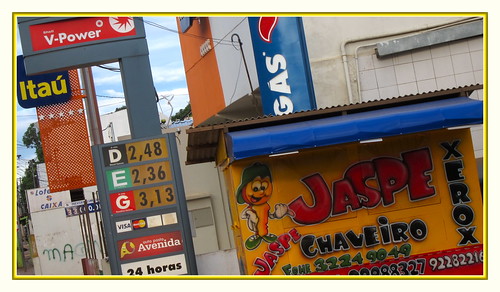HOW POOR FRAMING CAN TURN GOOD SCIENCE INTO DISINFORMATION

Fuel prices and key-maker sign in Rio Branco AC Brazil
Yesterday, some very important new research was reported establishing that planting sugar cane on land previously cleared for cattle pasture in Brazil would have a cooling effect on the local climate and was better than clearing more native cerrado.
Unfortunately, one of the study authors and the editors at Nature Climate Change gave the findings an unsupported biofuel twist (perhaps in an effort to hook more Internet traffic).
Sweetening biofuel production
Expanding biofuel production into agricultural land reduces the need to clear natural ecosystems and can benefit the global climate through reduced greenhouse-gas emissions. A remote-sensing study of the Brazilian Cerrado now provides empirical evidence that sugar-cane expansion also cools local climate directly by altering surface reflectivity and evapotranspiration.
I caught up with the article when Mongabay.com (the world's leading rainforest information portal) ran a report headlined, "Sugar cane ethanol cools climate when it replaces cattle pasture." I was concerned and wrote immediately to Mongabay editor Rhett Butler. Here is our exchange:
Rhett,
WOW! What a misleading title! I know the spin was given by Nature but why has Mongabay carried forth such an obvious ethanol ploy? Surely replacing cattle pasture with sugarcane plantations would have a cooling effect but there is nothing that suggests that doing it to produce ethanol would produce more local cooling than to do it to produce sugar.
Currently there is a crisis in ethanol production in Brazil. Soaring global sugar prices are sending the cane to sugar mills instead of ethanol refineries. Right now this has precipitated a supply crisis forcing Brazil to import 150 million gallons of US corn ethanol this month (and also import gasoline because the shortage of ethanol is causing owners of flex-fuel cars to go to gas).
One can be certain that the dual pressures of food and fuel will drive more land-grabbing from native cerrado or forest lands for agricultural production. Yes, there is a lot of degraded land that could be restored for agricultural production but it is still cheaper to grab intact ecosystem land with good soil than to pay the costs of soil renewal in degraded places.
The resulting land-use conversion is what ultimately drives carbon emissions and global warming and not whether the crops are used for food or fuel.
Lou Gold
Lou
Greg Asner and Scott Loarie have nothing to do with the cane ethanol lobby. The point of the paper is simply that converting cattle pasture to cane is better for climate than leaving it as pasture. The authors explicitly warn against converting natural vegetation, noting that loss of cerrado produces more warming than going from pasture to cane.
Rhett
Rhett,
Asner and Loarie are outstanding scientists and, of course, they have nothing to do with the ethanol lobby. I am not charging conspiracy.
I have read the original at Nature Climate Change.
It is clearly framed as a statement about BIOFUEL along with a less prominent caveat against converting native lands.
The data show that sugarcane plantations are more cooling than cattle pasture. The data do not show anything about leakage or triggered land-use change or sugarcane expansion for ethanol versus sugar. We have three pressures here -- sugar, ethanol and beef. To favor any one is to push the others to new locations as long as global demand is soaring.
These ledes:
(from Mongabay) "Sugar cane ethanol cools climate when it replaces cattle pasture"
(from Reuters) "Sugarcane grown for fuel cools Brazil's climate"
are going to spread quickly across the global media as a counter argument to the established science showing that the cumulative impact of using cropland for biofuel production can trigger unfortunate consequences in the big picture.
Poor framing of good science can easily lead to more disinformation.
Why not be more careful?
Lou
Consistent with the editorial integrity that I have come to expect and depend upon from Mongabay, Rhett wrote back saying that I was right and that he was changing he title to "Sugar cane cools climate when it replaces cattle pasture."
It will be interesting to see if the editors at Nature.com and the Carnegie Institution for Science are willing to make similar corrections.






No comments:
Post a Comment